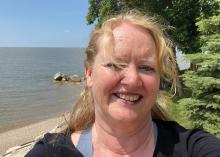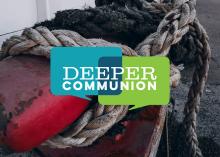Adapted from “The Andrew Klavan Show” on DailyWire+ You know, I was so impressed with the Democratic National Convention, I’ve decided...
Vous n'êtes pas connecté
- English
- Français
- عربي
- Español
- Deutsch
- Português
- русский язык
- Català
- Italiano
- Nederlands, Vlaams
- Norsk
- فارسی
- বাংলা
- اردو
- Azərbaycan dili
- Bahasa Indonesia
- Հայերեն
- Ελληνικά
- Bosanski jezik
- українська мова
- Íslenska
- Türkmen, Түркмен
- Türkçe
- Shqip
- Eesti keel
- magyar
- Қазақ тілі
- Kalaallisut ; kalaallit oqaasii
- Lietuvių kalba
- Latviešu valoda
- македонски јазик
- Монгол
- Bahasa Melayu ; بهاس ملايو
- ဗမာစာ
- Slovenščina
- тоҷикӣ ; toğikī ; تاجیکی
- ไทย
- O'zbek ; Ўзбек ; أۇزبېك
- Tiếng Việt
- ភាសាខ្មែរ
- རྫོང་ཁ
- Soomaaliga ; af Soomaali
 Maroc - CANADIANMENNONITE.ORG - A La Une - 09/Aug 13:35
Maroc - CANADIANMENNONITE.ORG - A La Une - 09/Aug 13:35
Living my land acknowledgement
I was nervous the first time I offered a land acknowledgement in church, wondering how people would respond. Afterwards, one person thanked me while another questioned whether a land acknowledgement had any place in a worship service. I took the question at face value and considered why I believe it has a place in a church setting. The next time I gave one, I spoke about both gratitude for God’s creation and recognition of the church’s role in colonization of this land’s first peoples. This was and is my answer to the question; other individuals and churches may consider it differently. Over the last number of years, land acknowledgements have become mainstream. Public events often begin with the emcee reading carefully constructed statements about the Indigenous people who first inhabited the territory, along with vague overarching commitments to Reconciliation. Those crafted statements make me uncomfortable. They feel formulaic rather than tied to concrete change. Lately, I’ve also heard more and more Indigenous people express discomfort with land acknowledgements. The acknowledgements often paint Indigenous people as historic rather than present neighbours and kin who continue to be affected by colonization. Such words can seem hollow without specific examples of the action people are taking toward Reconciliation. As land acknowledgements become mainstream, they lose their power to be disruptive. Some elders and Indigenous leaders are encouraging people to stop giving land acknowledgements until our society protects Indigenous women and girls as well as land rights. Other Indigenous leaders suggest a third way: personalized land acknowledgements. On the advice of some local Indigenous community leaders, my workplace has adopted that practice. I’ve shared my personal acknowledgement a few times and each time it’s a bit different. This approach moves the land acknowledgement from being a quick band-aid on a large wound to a reflection that inspires consideration. Writing an acknowledgement requires time and effort. It means considering my relationship with the land and looking at my current relationship with First Nations, Inuit and Métis peoples. It also asks me to consider the concrete actions I am taking and will take toward right relationships. I don’t know if my land acknowledgements have affected other people’s perspectives, but I know they have changed mine. In addition to thinking about my relationships with Indigenous peoples here on Treaty 1 Territory, I’ve begun thinking much more about my relationship with the land itself. I’ve started wondering what my life and my relationship with the land would look like if I lived out the values behind a land acknowledgement. I ask myself what it would look like if, in a manner of speaking, I considered my land acknowledgement to be a way of living in relation to the land and those on it—something lived out rather than merely verbalized. Traditional Indigenous worldviews do not consider land as a commodity to be owned; rather land is a part of the whole creation in which we are in relationship. Indigenous teachers encourage the rest of us to think differently than we’re used to. In Braiding Sweetgrass, Robin Wall Kimmerer says: “[O]ne thing our people could not surrender was the meaning of land. In the settler mind, land was property, real estate, capital, or natural resources. But to our people it was everything: identity, the connection to our ancestors, the home of our nonhuman kinfolk, our pharmacy, our library, the source of all that sustained us. Our lands were where our responsibility to the world was enacted, sacred ground. It belonged to itself; it was a gift not a commodity, so it could never be bought or sold.” This shift to a focus on how I live my life is new to me, and I’m still figuring out what it means, but I know it is important. While land acknowledgements without specific actions that lead to change are problematic, authentic land acknowledgements have been a part of my journey to be a partner in Reconciliation. They have prompted me to learn of those who originally lived in the places I have lived, to explore the impacts of colonization on Indigenous neighbours— or relatives, as I’ve learned to refer to us all—and to change my relationship with the land. I strive to live into Kimmerer’s exhortation: “To become naturalized [to place] is to live as if your children’s future matters, to take care of the land as if our lives and the lives of all our relatives depend on it. Because they do.” Heather Block attends Aberdeen Mennonite Church in Winnipeg, on Treaty 1 Territory. Heather Block enjoying Treaty 1 Territory. Supplied Photo Share this page:
Articles similaires
The Regime’s Wars Are Built On Lies – OpEd
By Karen Kwiatkowski Americans are increasingly uneasy about their “national” security, and increasingly concerned that war is lapping at our...
The Regime’s Wars Are Built On Lies – OpEd
By Karen Kwiatkowski Americans are increasingly uneasy about their “national” security, and increasingly concerned that war is lapping at our...
City of Lethbridge – Updated Land Acknowledgement now available for community
Press Release September 06, 2024 A more inclusive and welcoming Land Acknowledgement has been released by the City of Lethbridge today following...
City of Lethbridge – Updated Land Acknowledgement now available for community
Press Release September 06, 2024 A more inclusive and welcoming Land Acknowledgement has been released by the City of Lethbridge today following...
Thirty years spent with OneFortyOne
With an official 30 years on the clock, and an extra eight pre-career break for kids, OneFortyOne Contractor Manager/EHSR Administrator Jenni Kain has...
Fred Trump III denounces uncle Donald for saying disabled people 'should just die'
Democracy Now! is joined by the nephew of Republican presidential nominee Donald Trump, who has endorsed Trump’s Democratic opponent, Vice President...
EDITORIAL – Suicide awareness event is both sad and uplifting
An editorial by Mel Rothenburger. ATTENDING THE ANNUAL walk for suicide awareness is not, on the face of it, an uplifting experience. In some...
EDITORIAL – Suicide awareness event is both sad and uplifting
An editorial by Mel Rothenburger. ATTENDING THE ANNUAL walk for suicide awareness is not, on the face of it, an uplifting experience. In some...
Binding and loosing in an age of division
For the past three years, the United States has been my home, and in the U.S., division is impossible to ignore. Liberals on the left, conservatives...
Les derniers communiqués
-
Four Seasons to Expand Saudi Arabian Portfolio Alongside Dar Al Omran Company with New Hotel in Madinah
Four Seasons Hotels and Resorts - 07/05/2024
-
Four Seasons Yachts Unveils Inaugural Itineraries to the Caribbean and Mediterranean and a First Look at its 95 Spectacular Suites
Four Seasons Hotels and Resorts - 27/03/2024
-
Visual 01Elevating Excellence: Four Seasons Embarks on the Next Stage of Strategic Global Growth
Four Seasons Hotels and Resorts - 22/01/2024



